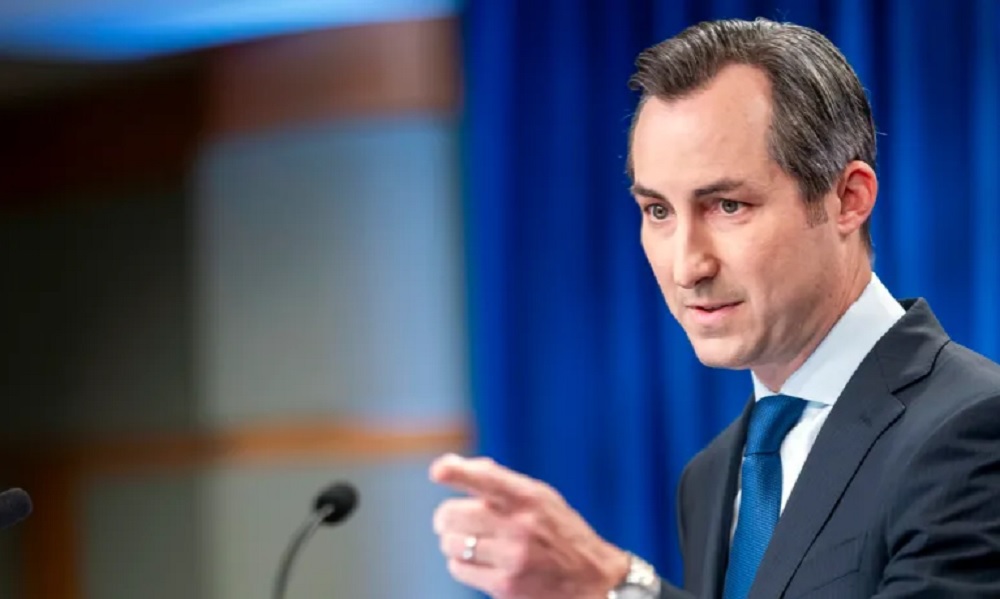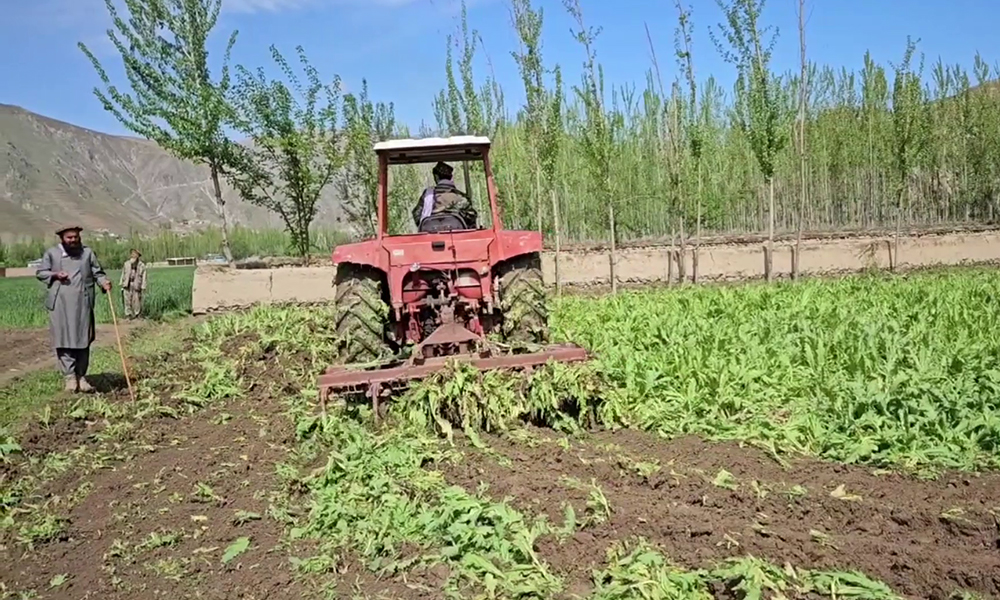Latest News
SIGAR blasts Washington for withholding key information on Afghanistan

The Special Inspector General for Afghanistan Reconstruction (SIGAR), John Sopko, said on Friday he has faced recent pressure from the U.S. State Department to redact some of the organization’s reports while noting the Pentagon classified much of its work detailing the failings of Afghanistan’s military forces.
He also referenced numerous attempts to “impede” his work, adding that “U.S. agencies have not made honest reporting easy for SIGAR.”
Sopko’s comments, published on SIGAR’s website, came at the Military Reporters & Editors Association’s annual conference, where the inspector general detailed multiple efforts by the State Department to get SIGAR to redact information from its reports, and remove all mentions of former Afghan president Ashraf Ghani.
“Those of you who have followed SIGAR’s work know that many of the reasons for the unexpectedly quick collapse of the Afghan government are problems that SIGAR has reported on for years – corruption; ghost soldiers; the dependence of the Afghan military on U.S. airpower, contractors, and other enablers; and incompetent Afghan leadership, to name but a few,” he said.
He also said SIGAR may be the only U.S. government agency that told “inconvenient truths” about the situation for the last 10 years.
“But we all know that U.S. agencies have not made honest reporting easy for SIGAR,” he stated.
Sopko’s address coincided with the release of its 53rd quarterly report, which includes information that shortly after the fall of Kabul, the State Department wrote to him and other oversight agencies requesting to “temporarily suspend access” to all “audit, inspection, and financial audit…reports” on SIGAR’s website because the state department “was
afraid that information included in those reports could put Afghan allies at risk”.
He said while he felt strongly that Afghans at genuine risk of reprisal should be protected, the state department was never able to give specific details on threats to individuals as a result of SIGAR’s reports.
He also said the state department did not explain how removing SIGAR reports could protect anyone since many were years old and already extensively disseminated worldwide.
“Nevertheless, with great reservation, I acceded to State’s initial request because it was made at the height of the emergency evacuation from Afghanistan,” he said.
After Sopko complied, the state department returned with another request, this time passing along a spreadsheet listing some 2,400 items it wanted redacted — something SIGAR reviewed and “found all but four to be without merit.”
“Given how hard the Department reportedly was working to evacuate Americans from Afghanistan and resettle Afghan refugees, I was surprised they found the time to go through every one of our reports and compile such an exhaustive list,” he said.
“Upon reviewing their request, it quickly became clear to us that State had little, if any, criteria for determining whether the information actually endangered anyone,” he added.
Among the requests was a plea to remove the name of a USAID official who publicly testified before Congress in 2017 and whose testimony is still posted on the committee’s site. It also asked SIGAR to remove Ghani’s name from all of its reports.
“While I’m sure the former president (Ghani) may wish to be excised from the annals of history, I don’t believe he faces any threats simply from being referenced by SIGAR,” Sopko said.
Addressing conference delegates he said: “No audience better understands the dangers of limiting public access to information in the name of ‘security’. And simply because the war in Afghanistan has
concluded does not mean the American people – or its elected representatives – do not have a right to know the truth about what happened in Afghanistan over the last 20 years.”
Sopko said that Congress has now tasked SIGAR with a number of assignments that include reports on why the Afghan government collapsed in spite of the $146 billion reconstruction effort; why the Afghan security forces collapsed; and whether Afghan government officials fled the country with U.S. taxpayer dollars; among others.
“In my opinion, the full picture of what happened in August – and all the warning signs that could have predicted the outcome – will only be revealed if the information that the Departments of Defense and State have already restricted from public release is made available,” he said.
He pointed out that the Department of Defense restricted from public release a range of information going back to 2015 on the performance of the Afghan security forces, purportedly at the request of the Afghan government.
This included information such as casualty data, unit strength, training and operational deficiencies, tactical and operational readiness of Afghan military leadership, comprehensive assessments of Afghan security force
headquarters leadership; and operational readiness rates down to the corps level.
“In essence, nearly all the information you needed to know to determine whether the Afghan security forces were a real fighting force or a house of cards waiting to fall.
“In light of recent events, it is not surprising that the Afghan government, and likely some in DOD, wanted to keep that information under lock and key,” he said.
“This information almost certainly would have benefited Congress and the public in assessing whether progress was being made in Afghanistan and, more importantly, whether we should have ended our efforts there earlier,” he added.
In recognition that this information will be essential for SIGAR to effectively respond to its Congressional directives, he said the bipartisan leadership of the House Oversight and Reform Committee and its National Security Subcommittee have formally requested that all information in SIGAR’s classified appendices be declassified by the originating agencies.
“At a bare minimum, DOD should immediately make available to SIGAR and the public the information restricted at the request of the Ghani government, for the simple reason that there no longer is a Ghani government and the Afghan security forces have already completely collapsed,” he said.
Sopko also called on Washington to declassify and make available to SIGAR and Congress all internal Department of Defense and State Department cables, reports and other material reflecting the security situation on the ground over the last few years – especially reports that differed from the public statements of the agencies in Washington.
“It is also important for SIGAR and Congress to have access to any reporting related to the reaction of the Ghani government and Afghan people to the withdrawal agreement signed between the Trump administration and the Taliban (IEA) in February 2020,” he said.
“What possible reason could remain for keeping all of this historical information out of public view?”
“Rather than attempt to impede SIGAR’s work, I believe the current administration should have every incentive to help us deliver the answers Congress has demanded,” Sopko said.
He also stated: “To answer these questions, we must find out what our government knew, when it knew it, and what it did, if anything,
with that information.
“SIGAR’s investigators are already interviewing Afghans who were evacuated to the United States to see what information they may be able to provide about corruption and other nefarious activities by former Afghan officials; SIGAR’s auditors and subject matter experts have already interviewed U.S. and Afghan government and military officials to start to put together the full picture of everything that happened that ultimately led to the Taliban (IEA) takeover just over two months ago.
“We already know a lot,” adding that while SIGAR has identified key lessons, “there is without question much more to be learned as we dig into what happened in Washington and Kabul during the months, weeks, days, and hours before Ghani fled and the Taliban (IEA) marched into his presidential palace without resistance.”
Latest News
US asks IEA to ensure Afghan soil not used by terrorists

The US State Department on Thursday asked the Islamic Emirate of Afghanistan (IEA) to ensure that Afghanistan is not used to support terrorist groups, movement of terrorists or acts of terrorism.
A State Department spokesman told Geo News that Washington has “been very clear that we will judge the Taliban (IEA) by what they do, not what they say.”
“The Taliban (IEA) wants international legitimacy. This requires the Taliban (IEA) to meet their commitments to the international community,” the official said.
The spokesperson said the most enduring interest for the US in Afghanistan was to ensure that it never again became a safe haven for terrorists, especially for those who wished harm to the US or its partners or allies.
“We are in regular communication with Pakistani leaders as a part of our partnership on counterterrorism issues. We continue to discuss Afghanistan in detail, including through our annual counterterrorism dialogue and other bilateral consultations,” the official said.
Islamabad has time and again urged Kabul to take meaningful action against terrorists using Afghan soil to launch attacks inside Pakistan.
However, the IEA has repeatedly rejected claims of militant groups in the country and have said they will not allow any group to threaten a country from Afghanistan.
On Tuesday, the Pakistan Army’s top commanders were briefed on how terrorist groups operating from Afghanistan pose a threat to regional and global security, besides acting as proxies against Pakistan and its economic interests, especially the China-Pakistan Economic Corridor (CPEC).
A day ago, the Inter-Services Public Relations (ISPR) said security forces had killed seven terrorists trying to infiltrate the Pakistan-Afghanistan border in the North Waziristan district.
In a statement, the military’s media wing had said the security forces on April 16 had detected a movement of a group of seven terrorists near the border in the Spinkai area of Ghulam Khan in the tribal district, Pakistan’s The News reported.
Latest News
Over 6,000 acres of land cleared of poppies in Badakhshan

Badakhshan Police Command says it has cleared more than 6,000 acres of poppy fields in northern Badakhshan province.
The anti-narcotics department of Badakhshan Police Command says that since the beginning of the campaign to destroy the poppy fields in this province, they have cleared more than 6,000 acres of land.
According to these officials, poppies have however been planted in more than 10 districts this year.
The anti-narcotics department of the Badakhshan Police Command says that the campaign to destroy the poppy plantations started two months ago and continues.
According to the officials, during this period, 6,300 acres of land has been cleared.
Some of the farmers whose fields were destroyed say that poppy is more profitable than other agricultural products, but now that their land has been cleared, they want alternative crops.
According to the officials, Kishim, Argo, Darayimand and Jurm districts are among the districts where poppies are cultivated.
Latest News
MSF ‘deeply concerned’ over new phase of deportations of Afghans from Pakistan

Médecins Sans Frontières (MSF) said Wednesday it was deeply concerned for the rights and welfare of Afghan refugees in Pakistan in the wake of the recent announcement by Islamabad that it plans to start Phase Two of the deportation campaign.
Pakistan is home to an estimated 3.7 million Afghans, and a reported 500,000 have crossed the border so far.
Many Afghans living in Pakistan have been there for decades and have spent more time in the country than their country of origin, without any legal recourse to remain in the only place they can effectively call “home”.
For many Afghans, Islamabad’s “repatriation” campaign means packing up their belongings and carrying them on a horse, cart, car and bus and traveling en masse to a country that is already struggling with widespread poverty, inadequate health services and increased restrictions on women, MSF said in a statement.
The second phase of the deportations leaves an estimated 800,000 Pakistan-issued Afghan Citizen Card (ACC) holders vulnerable to return, while phase three is expected to result in the further deportation of UNHCR-issued Proof of Registration (PoR) card holders, MSF said.
MSF first started working in Pakistan in 1986, and today provides much-needed medical care to people in Balochistan, Khyber Pakhtunkhwa and Sindh provinces.
The Islamic Emirate of Afghanistan (IEA) and UN agencies estimate that more than half a million people have been deported from Pakistan or voluntarily returned to Afghanistan in the past six months.
The United Nations High Commissioner for Refugees said last month that nearly two million Afghan refugees are living in Pakistan and that the agency needs $368 million this year to assist these people.
-

 Sport5 days ago
Sport5 days agoACL draw to be broadcast live on ATN channels
-

 Sport4 days ago
Sport4 days agoACL fever grows as fixtures finalized
-

 World4 days ago
World4 days agoUS will not take part in any Israeli retaliatory action against Iran
-

 Latest News4 days ago
Latest News4 days agoOver 50 people dead in traffic accidents over Eid
-

 Latest News4 days ago
Latest News4 days agoUS identifies Kabul airport suicide bomber
-

 Business4 days ago
Business4 days agoAfghanistan-Kazakhstan chamber of commerce opens in Herat
-

 Latest News4 days ago
Latest News4 days agoGood rains enable DABS to increase power production in Kabul
-

 World3 days ago
World3 days agoIsraeli military vows response to Iran attack as calls for restraint mount
























